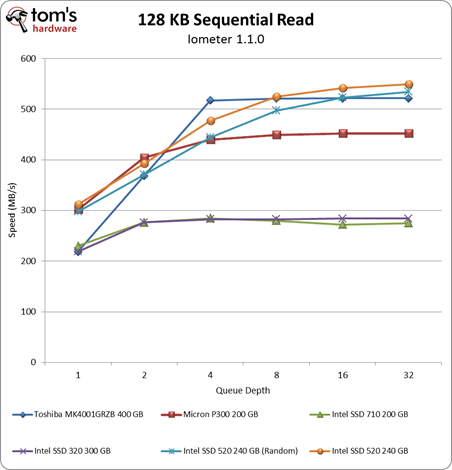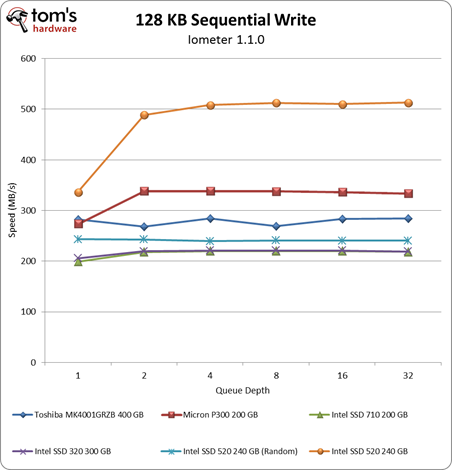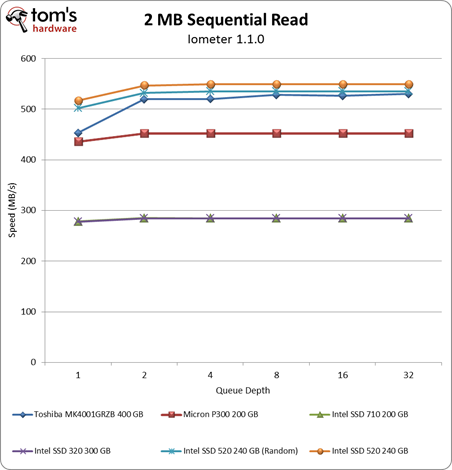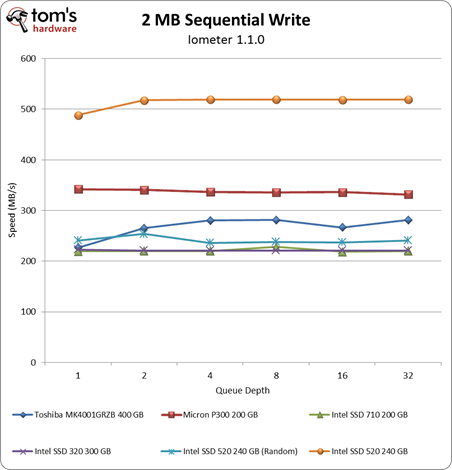Toshiba's $7000+ 400 GB SSD: SAS 6Gb/s, SLC Flash, And Big Endurance
128 KB And 2 MB Sequential Performance
128 KB Sequential
At a queue depth of one, Toshiba's SSD offers sequential read speeds just north of 200 MB/s, putting it on par with the SSD 320 and 710. As you scale up, however, the MK4001GRZB's performance peaks and plateaus at 510 MB/s. That's substantially better than Micron's P300, which is only able to reach a top speed of 450 MB/s.
In read-heavy enterprise workloads, Intel's SSD 520 looks like an attractive option. It's able to nearly match the much more expensive MK4001GRZB when there are more than eight outstanding I/O commands.
Although performance plateaus at a queue depth of two for all of our tested SSDs in this 128 KB sequential write test, there are substantial differences between the various models. Toshiba's MK4001GRZB falls just shy of 300 MB/s, while Micron's P300 pushes closer to 350 MB/s.
Interestingly, the SandForce-based SSD 520 hits speeds just over 500 MB/s when it's presented with compressible data. At the other end of the spectrum, when you hammer it with incompressible information, the SSD 520 barely outperforms the SATA 3Gb/s-capable SSD 320 and 710.
Moving to a larger block size makes the effect of queue depth less important. Using 2 MB transfers, Intel's SSD 520 leads the pack with a sequential write speed close to 550 MB/s (so long as you're working with compressible data, that is). The MK4001GRZB falls right behind at 520 MB/s, which roughly matches the performance of the SSD 520 as it operates on incompressible data.
Although Toshiba's offering doesn't top this chart, it still outperforms the Micron P300, which plateaus at sequential read speeds of 450 MB/s.
Get Tom's Hardware's best news and in-depth reviews, straight to your inbox.
Sequential 2 MB writes look a lot like the 128 KB chart without the impact of queue depth weighing on performance. The SandForce-based SSD 520 still reigns king when it comes to compressible data, though switching to incompressible information knocks Intel's newest desktop drive closer to the bottom of the chart.
Amongst the more purpose-built enterprise SSDs, Micron's P300 delivers the best performance at 350 MB/s. In comparison, Toshiba's MK4001GRZB falls a ways behind with speeds just shy of 300 MB/s.
Current page: 128 KB And 2 MB Sequential Performance
Prev Page 4 KB Random Performance Next Page Power Consumption-
compton Good job, Mr. Ku.Reply
Perhaps the Enterprise SSD Fairy will bring you a Hitatchi UltraStar with Intel's 6gbps controller. I'd be eager to see how it compares.
There is no substitute for SLC though. -
bennaye nebun$7000 any company willing to pay this much for an SSD is fullishReply
...fullish of cash? Definitely. Foolish? Probably not.
-
nebun bennaye...fullish of cash? Definitely. Foolish? Probably not.damn the english language.....there are way to many words that sound alikeReply -
nitrium Why is the 4KB Random read/write performance shown as IOPS, but 128KB and 2MB performance is in MB/sec? What speed (in MB/sec) does this drive achieve in 4KB? I guess I could calculate it from (IOPS * 4KB) / 1024 (I think that's right), but why should I have to?Reply -
spazoid amdfreakIt is too expensive for the performance it offers. You can get a RAID array of many Intel SSDs beating Toshiba in every segment.Reply
You've clearly not understood the purpose of this article. Stick to commenting the desktop drive reviews in the future, please.
Thank you for this review, and especially your estimations on the endurance of the drive. It's something that's damn near impossible for us IT professionals to get accurate estimations of in the real world. For some reason, bosses tend to want the expensive hardware to be put to use instead of being thoroughly tested.
More of these types of articles please! :] -
@spazoid, so you are telling me that you are willing to pay 10x for an endurance of 3x over the INTEL 520 SSD?Reply
Even when the INTEL SSD already has an endurance longer than your refresh cycle for your tech stack?
-
EJ257 frozonicLOL, i can just imagine myself in ten years telling my kids that we had to pay 7000$ for a 400gb ssd...by that time we are gonna have 400+ TB ssdsReply
"Back in my days storage drives used to have moving parts. Now its all solid state." -
jaquith I own a small data center and thankfully have access to a 'major' financial institutions test data, and I agree with your conclusions especially regarding deployment into production. $7K SSD is a tough call with a 5-year, but if it were 7~10-year then probably an easy call.Reply
Unlike super-sized enterprise which I am not, the cost/benefit calculations would be difficult for myself. I know firsthand the money that i.e. financial institutions push into their data centers, and for those folks $7K isn't out of the question.
Interesting SSD and if the prices come down and warranty extended then IMO it would be something to consider and compare against Intel's products.



